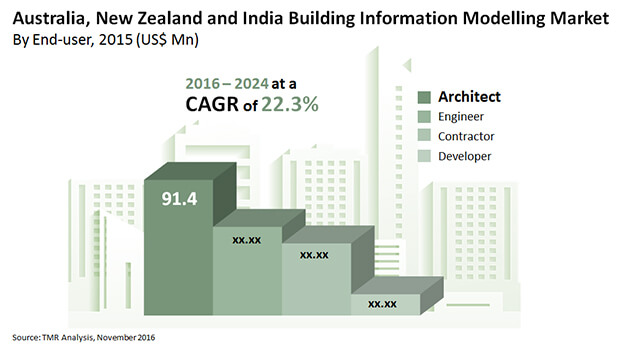Building Information Modelling Market: Insights On Crucial Growth Challenges 202Posted by Harshad Borde on January 3rd, 2020
The Australia, New Zealand, and India building information modelling (BIM) market features a low degree of competition owing to a low number of players, observes Transparency Market Research in a recent report. The market features a mix of large as well as mid-level companies, but regional players dominate, accounting for nearly 60% of the overall market. Some of the notable international firms operating in the market, such as Dassault Systèmes SA, Autodesk Inc., Bentley Systems, Inc., and Tekla Corporation, collectively accounted for a nearly 42% of the market in 2015. Leading players are currently focusing on providing cloud-based building information modelling (BIM) solutions. The rapidly rising demand for cloud-based software products is owing to their advantages such as instantaneous connection to multiple infrastructure development sites, management of information in real-time across the flow of supply chain, and efficient demand planning. Moreover, the companies are entering into strategic collaborations with real estate builders and firms to promote the benefits of BIM and henceforth increase its adoption level. Planning To Lay Down Future Strategy? Request Sample https://www.transparencymarketresearch.com/sample/sample.php?flag=S&rep_id=17129 Transparency Market Research states that the Australia, New Zealand, and India BIM market will witness a rapid rise in the introduction of cloud-based BIM solutions in the next few years. The overall market will exhibit a remarkable 22.3% CAGR over the period between 2016 and 2024, rising from a valuation of US4.0 mn in 2015 to US,335.3 mn by 2024. Cloud-based BIM Solutions to See Significant Rise in Adoption On the basis of solutions, the market is segmented into software, and professional and consultancy services. The software segment is further divided into on-premise and cloud based building information modelling (BIM). In 2015, the on-premise building information modelling segment accounted for maximum share of around 87% of the revenue of the overall building information modelling (BIM) software. However, cloud-based building information modelling software is expected to show sustainable growth during the forecast period due to technological advancements and cost effectiveness as compared to on-premise BIM software solutions. In terms of geography, India accounted for around 42.6% of the Australia, New Zealand, and India building information modelling market’s revenue in 2015. The country is expected to remain the dominant consumer of building information modelling solutions over the forecast period as well, exhibiting an exponential 24% CAGR over the period between 2016 and 2024. Government Initiatives Aimed at Lifting BIM Adoption Rate to Remain Key to Market Growth The continuous growth in BIM market during the forecasted period can be largely attributed to the strong government initiatives to lift BIM adoption rate and rise in construction activities across all the end-use industries in these regions. In Australia, for instance, the Australian Federal Government’s Infrastructure, Transport and Cities Parliamentary Committee suggested in March 2016 that the use of BIM should be made compulsory for all government funded infrastructure development projects valuing over mn. In New Zealand, the government formed the BIM Acceleration Committee in 2014 to encourage the adoption of BIM through alliances between the government and various stakeholders in the construction sector. High Initial Cost of BIM Software to Hinder Growth It is estimated that the initial cost of BIM software can go anywhere between US,000 to US,000, with additional expenses involved for installation and maintenance of the software. Such high costs incurred in implementing BIM software are the key factor why the rate of adoption of BIM among low-scale contractors or developers is low. Apart from this factor, the belief that the returns on investment for BIM are low and can lead to a reduction in the overall profit margins of a construction project is also hindering the widespread adoption of BIM software in New Zealand, India, and Australia. Like it? Share it!More by this author |



